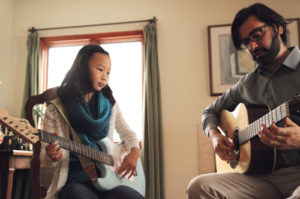Electric or Acoustic Guitar?
 For those interested in learning to play the guitar who do not yet own an instrument, you might wonder whether you should by an electric or acoustic guitar. Each has its pros and cons, which is why a little research can go a long way. Let us help you make your purchase by pointing out some factors you might not have considered.
For those interested in learning to play the guitar who do not yet own an instrument, you might wonder whether you should by an electric or acoustic guitar. Each has its pros and cons, which is why a little research can go a long way. Let us help you make your purchase by pointing out some factors you might not have considered.
Interest
You probably already have a sense of whether you prefer an electric or an acoustic guitar. Many students come to music lessons wanting to play certain songs, and these songs usually require a particular instrument. Therefore, there’s logic to buying the guitar that interests you most. You’ll be able to learn the songs you want to learn on their “correct” instrument. Plus, you won’t have to purchase the type of guitar you “really” wanted later on.
Ease
All things being equal, some guitarists say that electric guitars are easier to play than acoustic ones. This is for two main reasons: first, the body of an electric guitar is smaller and therefore easier to hold, and second, the strings are lighter than on an acoustic guitar.
Some students may not agree with this. Electric guitars require an amp and cables, and the extra equipment may seem cumbersome. However, the ability to adjust the volume on an amp also means you can make more sound with less work.
Cost
Although electric guitars may be easier to play, they are also generally more expensive. Between amps, cords, headphones, and the instrument itself, the cost can add up. An acoustic guitar, on the other hand, only requires itself, and tends to cost less as a whole. While you may be able to find deals for instruments, above all else you’ll want an instrument that works well and sounds decent when you first start out.
Practice
This goes hand in hand with interest, but ask yourself, which guitar do I see myself practicing with? The goal of guitar lessons is to learn how to play the guitar and less about the performance of it (at least at first). Once you get into serious performing, you can always switch guitars if need be.
However, it’s worth knowing yourself and considering which type of guitar will better suit your learning needs. Will tough strings frustrate you? Do you live in an apartment and need to practice with headphones? Do you want your guitar to be portable? Answering these questions and similar ones, along with understanding the mechanics of learning an instrument (as opposed to how you see yourself performing an instrument) can help you decide which kind of guitar to purchase.
Final Thoughts
If you truly can’t decide, you could always rent an acoustic guitar and/or an electric guitar through our rental instrument program. It’s a rent-to-own program so if you make a decision as to which guitar you’d like to continue with after the first couple of months, a large majority of what you pay goes towards owning the instrument. A three month trial rental is always an affordable way to try out any instrument!
As you’ve figured out by now, each has its own strengths and weaknesses, so it comes down to what you want out of your musical experience. And if you still can’t decide but can’t afford to buy both, you could always ask your new guitar teacher what they recommend for you. The most important thing is that you make a decision so that you can spend more time learning and playing, and less time fretting over the decision.

